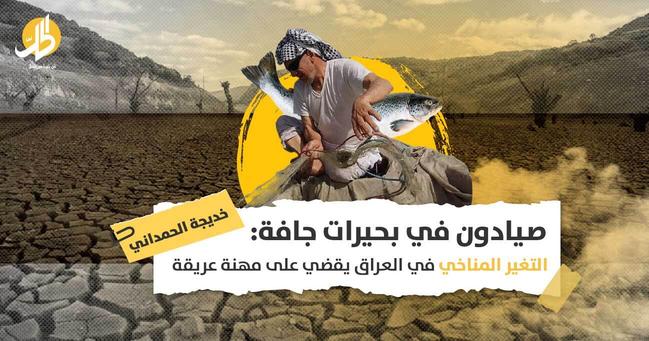The agricultural sector in Iraq: Does climate change lead to a new wave of displacement in the country?
| أستمع للمادة |
It seems that the agricultural sector in Iraq is facing serious crises.Muhammad al -Khafaji, the Iraqi Minister of Agriculture, prompted the appearance in front of television, and speaking publicly and in front of public opinion, that "Iraq faces a real threat, which threatens a mass migration from the countryside to the cities, because of the drought that strikes it."
It is worth noting that the agricultural sector in Iraq has stopped developing since the 1980s.There was no reason to keep pace with modern technology, regarding the adoption and use of the types of seeds that generate a large crop, pesticides of insects and modern herbs, and the full formation of improved agricultural practices (plowing, planting, irrigation and the use of fertilizers).And the reasons are many, including entering Iraq in deadly wars.And the successive economic crises that struck him.
Shocking information from the Minister of Agriculture
"Large agricultural areas came out of the government plan during the past year, and the Iraqi countryside is witnessing reverse migration.".This is what Minister Al -Khafaji stated the Iraqi people, saying that “about 90% of the Diyala regions (famous for their abundant production of citrus fruits), came out of the agricultural plan..There are attempts to save the governorate orchards, whose area is estimated at a hundred thousand dunums, by digging wells..
Either Nineveh, the second largest province of Iraq, also witnessed agricultural migration due to drought.After I managed to grow six million dunums in the year 2020.But this did not last long. This number fell to three hundred thousand dunums only in the year 2021.According to what the Iraqi Minister of Agriculture disclosed.
Al -Khafaji asked: “After this, where the farmers will go.They will abandon the villages and countryside and go to the city to search for work, and cause randomness..As he put it
A study conducted by the International Organization for Migration, with the support of the US State Department- the Office of Population, Refugees and Immigration, revealed facts on the agricultural sector in Iraq..And immigration in the cities of the south of the country.

The study stated that "the environmental deterioration, over the past ten years, has caused severe damage to the agricultural sector in Iraq.Water scarcity is exacerbated.What makes agriculture unable to provide adequate and sustainable livelihoods, especially in rural areas..
According to the international organization, “the consequences of climatic challenges facing the country, especially those related to water scarcity, have long -term and urgent traces..Taking coordinated measures to reduce needs, avoiding more displacement, and preventing existing social problems..
The necessity of changing laws to save the agricultural sector in Iraq
"The agricultural sector in Iraq is broken, and it needs to enact new laws to save it and advance it again.".This is what Hussein Al -Tamimi, President of the Union of Agricultural Associations in Iraq believes.He suggested, in his interview with "Al -Halt Net", "Merging the Ministries of Water Resources and Agriculture with one ministry.To get rid of the deadly routine.And be able to draw a plan prepared by one ministry, you can end the dying of agriculture in the country..
The current indicators are very worrying for Tamimi.Especially since it warns of limiting agriculture in Iraq, the migration of farmers from agricultural lands, and heading towards cities.However, he sees the possibility of "facing these threats by developing strategic plans.It is to provide real needs for farmers.With the creation of an agricultural bank.Similar to what was in force in previous decades..
Articles may interest you: “The pearl of the desert”..The Iraqi "Saoo" might go away!
The deadly desertification of the agricultural sector
According to the expectations of the specialists, Iraq is close to the third stage of desertification, which is considered "the most severe stage, which may lead to great disasters.Including high temperatures.Then it becomes difficult to stop the deterioration of the agricultural sector in Iraq.The processors will need fictional amounts. ”.According to Tahsin Al -Khafaji, agricultural and water expert.
"Everyone is not aware of the size of the risk that Iraq will face in the coming years.Mesopotamia may leave a difficult heritage for the generations that will come later..
In addition to the scarcity of rain, Iraq faces the problem of Turkish and Iranian hegemony over the waters of the Tigris and the Euphrates.And their insistence on manipulating the quantities of water releases received for Iraq.The dams and tanks in Iraq accommodate about one hundred and sixty billion cubic meters of water.And the current revenues from Turkey and Iran reach at its peak to thirty -five billion cubic meters on the Tigris and Euphrates rivers.
“These violations will not intercede for Iraq for the international community, nor will the rulers be fair to the international organizations.Because he does not have a correct water policy, nor a modern irrigation system, represented by drip systems..According to the opinion of the water expert.
Al -Khafaji also stressed that “the lands suitable for agriculture in Iraq are estimated at about forty million dunums.And what is now grown from this area is only two million.Not to mention that 70% of the people live on the agricultural sector in Iraq..Determining, at the same time, that "the Ministry of Water Resources reveals the real number of its water store", which he described as "frightening".
According to a United Nations report, Al -Khafaji reviewed part of it, "The signs of desertification have become clear to Iraq.Since 2020, dirt storms have increased from fifteen storms to three hundred storms annually.This will also affect neighboring countries..
Regarding solutions to the problems of the agricultural sector in Iraq, the water and agricultural expert stresses, "The importance of developing irrigation means.A study to deal with internal water revenues, which constitute 30% of the total water connected to Iraq.In addition to desalination of sea water.And the use of groundwater in an optimal way.And the development of seeds with high temperatures..
رابط مختصر :انسخ الرابط









